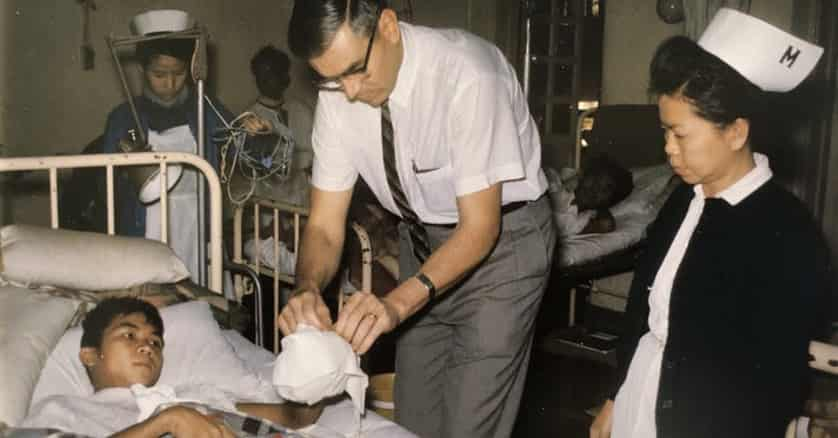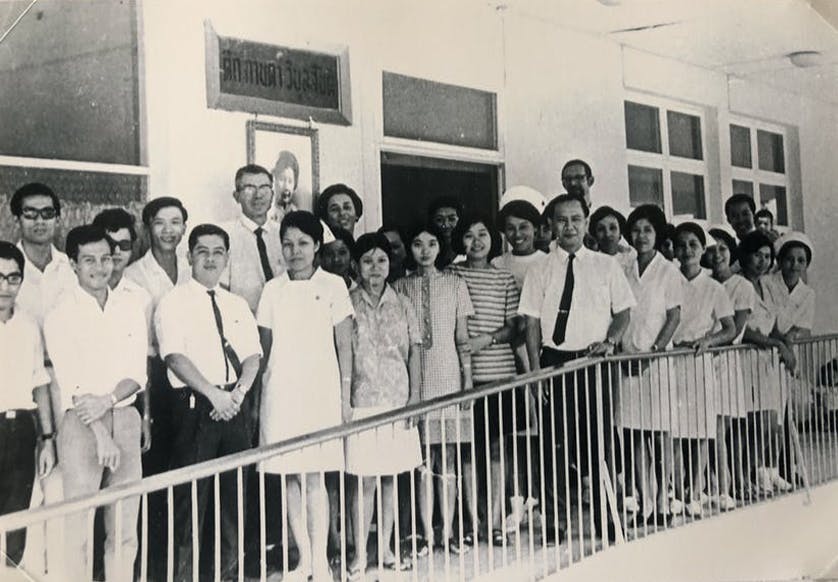When I was a little girl, my grandmother would let me play with her jewellery. She would always wear this silver necklace, a pendant decorated in bells and tassels that was given to her in Thailand. I would sit on her lap, fidgeting with the silver, as she told me stories about Chiang Mai, where she and my grandfather served as medical missionaries at McCormick Hospital.
My grandparents, Harold and Harriet Hanson, came to Thailand in 1960, when Chiang Mai was a small agrarian city of 50,000 and the airport was a cow-studded field. With them, they brought their three young sons, my uncles, Eric and Mark, and my father, Gordon. Little did they know that their journey across the Pacific was the start of a generational love affair with a place far from home.

In the 1960s, resources and health systems in Thailand were minimal. It was nothing like the advanced and internationally recognised health care available today. People frequently died from preventable diseases and many communities suffered from a lack of access to care. My grandparents were part of a movement by the American Presbyterian church and the Thai Church of Christ to send missionary doctors to train nursing students and develop hospitals.
Medical missionaries have been in Thailand since 1828. In the early years of their service, they were credited with bringing Thailand’s first printing press, performing the first surgery, and giving the first smallpox vaccination. While their efforts and innovation were admirable, they did not win over a single convert until 1850. They did, however, open many hospitals across Thailand and play a vital role in developing Thailand’s public health system. An early missionary, James McKean, organised smallpox vaccination initiatives. McKean later set up the McKean Leprosy Hospital in southern Chiang Mai to care for leprosy patients and help them become economically independent.
When Harold and Harriet arrived at McCormick in 1961, there were three other American doctors on staff. Dr. Ed McDaniel, an OBGYN who led Thailand’s successful family planning programme, Dr. John Guyer, who worked in internal medicine, and Helene Newman, a registered nurse that taught midwifery to nursing students.
Harold was the sole surgeon. Although he was trained in general surgery, he was tasked with anything that made its way to McCormick. He did neuro surgeries, ear, nose, and throat surgeries, removed foot long intestinal worms, and operated on men who were gored by elephants. When on furlough in the US, he would study new surgical techniques to bring back to Thailand.
Harriet was the leading paediatrician. When she first arrived, premature babies were cared for in wooden boxes with light bulbs. She wrote to hospitals in America and had them send extra incubators to care for infants.

Harold and Harriet helped McCormick grow. During their time in Chiang Mai, Harriet oversaw the planning of the paediatrics building and Harold worked with staff in America to build the surgical ward. Both are in operation today. Harriet notes that when she returned to visit Chiang Mai in 1994, “the paediatric ward was like those in the United States, none of the preventable diseases were there”.
McCormick played a vital role in developing public health in Northern Thailand. In addition to Dr. McDaniel’s efforts to provide access to widespread contraception, the hospital routinely gave out immunisations. Nurses training at McCormick would spend two years practicing public health, going to villages and immunising for diseases like tetanus, smallpox, and typhoid. On weekends, Harold and
Harriet, along with a slew of other doctors, dentists, and pharmacists, would make their way to villages, treating intestinal parasites, malaria, malnutrition, and anything else they could reach.
My grandparents, along with my father and his two older brothers, left Chiang Mai in 1969. After returning to California, they spent 40 years collecting surplus medical supplies and shipping it to hospitals in developing countries. They sent 80 shipping containers to 60 hospitals in 22 countries. The first of which came to Chiang Mai.

50 years pass and missionary medicine starts to look different. Dr. Ed McDaniel’s family planning interventions became one of the earliest successful population control efforts in Asia and continues to be a role model for its neighbours. Long-term missionary doctors do not stay in Thailand. They no longer need to. The health care system is flourishing. Thailand is the only middle income country to rank in the top 10 public health systems in the world.
Thailand, however, has not yet released my family from her care.
Eric, the oldest of the Hanson sons, is an orthopaedic surgeon, inspired from seeing surgeries at McCormick as early as seven years of age. Eric says his experience in Thailand and at McCormick “made me a world citizen, I am intrigued by societies and cultures all over the world.” In his adult life, Eric found his way back to Chiang Mai.
Eric is a board member of the Integrated Tribal Development Foundation, ITDF, a Chiang Mai based NGO run by his childhood friend Mike Mann. Each year Eric returns to Chiang Mai to work with ITDF and to provide medical care to villages, much like the work of his parents 50 years prior. Eric and his wife Darlene, founded Lanna Coffee US, a counterpart of ITDF that sells coffee grown by hill tribe villages in Northern Thailand to support their economic development. Their work is a labour of love for a city that has shaped the Hanson family across generations.
I too have been able to build my own relationship with the country that is so embedded in family lore.
It is September of 2019 and I sit in my grandparent’s retirement home in Fresno, California. I came to say goodbye before heading off to complete a Fulbright grant teaching English in Nakhon Si Thammarat, Thailand.

My grandfather, now 93, pulls out a binder, a carefully dictated scrapbook that details their time in Thailand and the history of McCormick. He recounts the many surgeries and ceremonies. He points out a child being treated for malnutrition. He shows me an operating table covered in intestinal worms that he removed from a young boy. My grandmother mentions a cholera outbreak and remembers having to treat patients on the front lawn of the hospital. He tries to teach me some basic Thai words. 50 years later and they roll off his tongue easily, with grace and purpose. I repeat, or I try to. Mine are jumbled, my tones jump, I cannot mimic the steady rising and falling that he so calmly commands. Even the name of my future home, Nakhon Si Thammarat, sounds timid and unsure. He shakes his head. One day. He says.
Seven months later and he is right. After one semester teaching, my coworkers rate my Thai a solid 3 out of 10. Not bad but not good. I’ll take it. I can confidently rule over a classroom of 45 eight year olds. The rest will come in time.
I travel around the country marvelling at its modernity. My family visits and we fly to Chiang Mai for New year’s. Eric and Darlene join us before heading off to do development work with ITDF. Together we visit McCormick. My dad is back for the first time since he left as a child. The brothers stand in front of their old house, which now belongs to the Payap University School of Music. I take the picture with my Iphone. 50 years older and wiser, both married with two grown kids, they stand in front of the house that symbolises their parent’s quest to improve human health.
Three weeks later and I am at a school assembly for Children’s Day. I am wearing my grandmother’s emerald green Northern Thai skirt and her Lanna style silver belt. I close my eyes and picture myself sitting in her apartment. Artefacts from life in Chiang Mai stand out like treasures from a time before. Walls are covered in Thai wooden carvings and paintings of fishing villages. My grandmother’s tables are decorated in silver bowls and Kar-n woven table runners. Their love for this country and the culture is abundantly clear. Now, so is mine.
Thea Hanson joined Citylife in March 2020 as an intern, under her Fulbright Scholarship programme. Unfortunately, as all Fulbright Scholars worldwide, she was recalled home following the outbreak of the coronavirus. Thea spent two weeks at Citylife and in Chiang Mai, mostly exploring her family history and writing this lovely piece.



